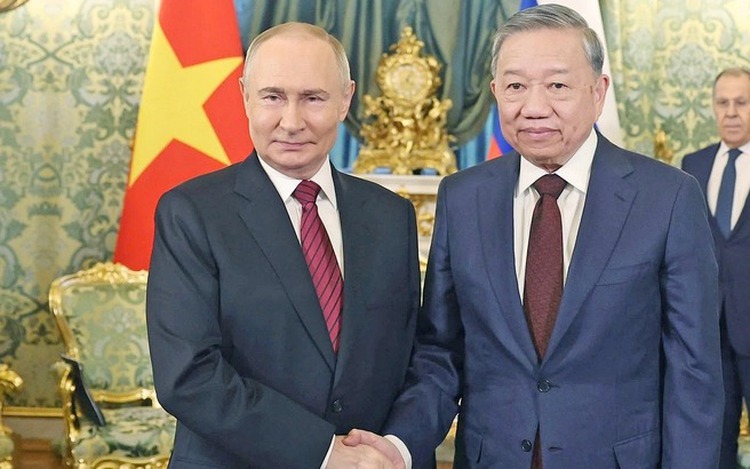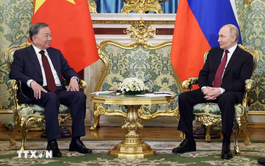
Russian President Vladimir Putin (L) shakes hands with Vietnamese Party General Secretary To Lam at their meeting in Moscow, Russia during the latter’s state visit from May 8 to 11, 2025.
The visit – General Secretary To Lam’s first trip to Russia since taking office last year – marked a new chapter in the comprehensive strategic partnership between the two countries.
During talks at the Kremlin on May 10, Party chief Lam and Russian President Vladimir Putin pledged to elevate cooperation in key areas, identifying science and technology, nuclear energy, digital infrastructure, biotechnology, and semiconductor manufacturing as strategic priorities.
Both leaders emphasized the need for substantial, effective collaboration through flagship projects that reflect the evolving nature of bilateral ties.
A joint statement issued after the visit laid out orientations for enhancing the partnership in the new era of cooperation.
More than 20 cooperation agreements were signed between both sides' ministries and agencies, providing a legal framework to advance joint initiatives across multiple sectors.
Vietnam’s nuclear ambitions gain a boost
A key initiative of bilateral cooperation is the proposed Nuclear Science and Technology Research Center in Dong Nai Province, southern Vietnam.
Vietnam has identified the peaceful use of nuclear energy as a long-term strategic priority to ensure energy security and boost technological development.
President Putin emphasized that civil nuclear cooperation could be a catalyst for Vietnam’s economic growth and human resource development.
He noted that Vietnamese experts are already working at Russian nuclear facilities abroad, underscoring their compatibility with global standards set by Rosatom, Russia’s state nuclear corporation.
General Secretary Lam reiterated Hanoi’s commitment to reviving the long-shelved Ninh Thuan nuclear power project in the eponymous province in south-central Vietnam.
During a visit to the proposed site earlier this year, he expressed strong political support for moving it forward, signaling Vietnam’s readiness to work closely with Russian partners.
Beyond nuclear energy, the two countries are expanding cooperation in other essential fields.
Energy, transport cooperation
Oil and gas remain central to Vietnam–Russia economic relations, with the Vietsovpetro joint venture continuing to symbolize their long standing partnership.
Both sides agreed to expand oil and gas exploration and production activities in their respective territories, as well as enhance collaboration in liquefied natural gas (LNG) supply and refining.
In addition, Vietnam and Russia are exploring cooperation in transportation, mining, shipbuilding, and mechanical engineering.
There is growing interest in modernizing Vietnam’s railway infrastructure and expanding regional transport corridors to strengthen trade connectivity.
In a policy address at the Russian Presidential Academy of National Economy and Public Administration, General Secretary Lam stressed the need to balance trade and diversify exports.
Despite the robust political relationship, bilateral trade reached just US$6 billion in 2024 – a modest figure that underscores untapped potential.
To that end, both countries agreed to facilitate two-way investment and broaden financial and credit cooperation, particularly in banking and fintech.
Vietnam affirmed its support for Russian enterprises operating in strategic sectors and encouraged Vietnamese businesses to enter the Russian market.
Strategic trust underpins long-term cooperation
The visit to Russia was also an opportunity to reaffirm mutual political trust, which has underpinned Vietnam-Russia ties since the establishment of their comprehensive strategic partnership in 2012.
Security and defense cooperation continues to deepen, with a shared commitment to addressing non-traditional threats such as cybercrime and transnational high-tech crime, based on international law and norms.
Vietnam’s foreign policy of independence and diversification aligns well with Russia’s strategic outreach to Asia, enabling the two nations to work together without pressure from external actors.
Russian scholars and analysts view Vietnam as a reliable partner, with the potential to become a regional hub for Russian technological and industrial cooperation.
Looking ahead, both sides hope to see new flagship projects that symbolize the next phase of the relationship.



Max: 1500 characters
There are no comments yet. Be the first to comment.